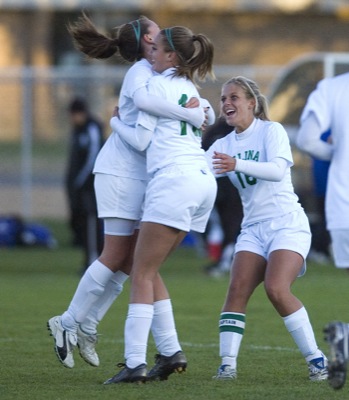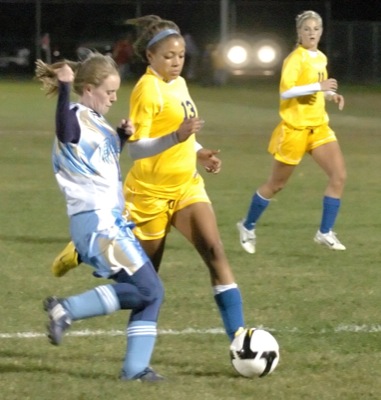Thursday, October 23rd, 2008
Soccer player gets kicked off football team
By Janie Southard
ST. MARYS - Can a student play in two different sports in one season?
No, that's the answer St. Marys school board members gave during a well-attended special board meeting Wednesday night.
It became an issue when a soccer player joined the varsity football team as a kicker just weeks before playoffs.
Board policy states that "an athlete is eligible to participate in only one interscholastic sport during any athletic season."
Senior athlete Zachary Albert played soccer this fall and joined the football team when the soccer season ended. Although he has not played in a game, he has practiced with the team and was dressed on the sidelines during at least one league game.
He joined the football team after getting approval from some athletic department staff members.
When Zachary's circumstance was brought to the attention of school administrators at a social function, high school Principal Mike Makley and Superintendent Mary Riepenhoff determined he was in violation of the dual participation policy.
Lyle and Kay Albert, Zachary's father and grandfather respectively, presented to school board members on Wednesday arguments in support of his football eligibility. Also attending that meeting were a dozen or so members of the district's coaching staff, including head football coach Doug Frye.
The Albert family believes "Zachary has become the victim of an administrative interpretation which, frankly, may be perceived as resulting in harmful and unjustified treatment," they wrote in a letter to the board.
In a nutshell, they believe soccer concludes when that season ends and not at the end of the fall sports season. Thus, Zachary is not currently playing two fall sports, they say.
Board member Craig Gottschalk, pointing out the ambiguity of the policy, instigated a discussion to craft a definition of a sports season, which did not happen by the meeting's end.
The definition of season put forth by the Ohio High School Athletic Association was of no help as it muddied the water with two definitions: 1) the season extends from the first practice of any fall sport to the final game of any fall sport; or 2) the first practice of a particular fall sport to the conclusion of that sport's program.
The family then asserted that item G in board policy 5500.01 states that if a student quits a team, he is ineligible for ... any other sport unless given permission to join another team by the athletic director and the two head coaches involved.
Later in the discussion, the head soccer coach stated that, should the situation go in this direction, he would not give permission.
Board members Ralph Wiley, Gottschalk and Rees McKee stated their opinions that the dual policy is to give any student who wants to play sports the opportunity to participate, rather than have the entire athletic program focused on students more gifted in athletic ability.
Wiley stated many times during the meeting that the board policy as it currently stands allows a student to participate in one fall sport, one winter sport and one spring sport. Riepenhoff added that no one she consulted with about this policy said dual participation was "okay."
McKee said following the meeting that the policy does need to be tightened up. "But I believe we met the spirit of the policy in that dual participation is not allowed ... I feel for Zachary. He got put in a situation he should never have been put in," he said.
The board's policy committee will tackle this item again to develop more explicit language.


